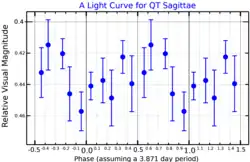WR 128
WR 128 is a Wolf–Rayet star located about 9,500 light years away in the constellation of Sagitta. A member of the WN class, WR 128's spectrum resembles that of a WN4 star, but hydrogen is clearly present in the star (hence the h in its spectrum), making it the only known hydrogen-rich WN4 star in the galaxy. However, similar H-rich very early WN stars can be found in the LMC and especially in the SMC, but the only other galactic examples of this are WR 3 and WR 152.[7]
| Observation data Epoch J2000 Equinox J2000 | |
|---|---|
| Constellation | Sagitta |
| Right ascension | 19h 48m 32.19686s[2] |
| Declination | +18° 12′ 03.69399″[2] |
| Apparent magnitude (V) | 10.51 |
| Characteristics | |
| Evolutionary stage | Wolf-Rayet |
| Spectral type | WN4(h)-w[3] |
| U−B color index | −0.89[4] |
| B−V color index | -0.02[4] |
| Astrometry | |
| Radial velocity (Rv) | 100.00[5] km/s |
| Parallax (π) | 0.3129 ± 0.0417 mas[2] |
| Distance | 2,900+540 −390[6] pc |
| Absolute magnitude (MV) | −3.27[3] |
| Details | |
| Mass | 11[3] M☉ |
| Radius | 2.69[3] R☉ |
| Luminosity | 166,000[3] L☉ |
| Temperature | 70,800[3] K |
| Other designations | |
| Database references | |
| SIMBAD | data |
Properties
Analysis of WR 128's spectrum with PoWR shows that it has a temperature of around 70,800 K and is losing mass at a very slow pace (in Wolf-Rayet terms), at 10-5.4 M☉/year, or in other words, 1 solar mass every 250,000 years.[3] All this mass is being carried by a very strong stellar wind with a terminal velocity of 2,050 kilometres per second. Taking its distance into account, WR 128 has a luminosity of 166,000 L☉, or 105.22 L☉,[3] making it one of the dimmest galactic WN stars. Using the Stefan-Boltzmann Law, we can calculate a radius of 2.69 R☉. A "transformed" radius at an optical depth of 2/3, more comparable to other types of stars, is at about 13 R☉.[3]
References
- Antokhin, I. I.; Cherepashchuk, A. M. (January 1985). "Wolf-Rayet stars with possible relativistic companions - Light curves and orbital periods for the WN stars HD 187282, HD 192163". Soviet Astronomy Letters. 11: 355–358. Bibcode:1985SvAL...11..355A. Retrieved 5 March 2022.
- Gaia Collaboration (2018-04-01). "VizieR Online Data Catalog: Gaia DR2 (Gaia Collaboration, 2018)". VizieR Online Data Catalog. 1345. Bibcode:2018yCat.1345....0G.
- Hamann, W.-R.; Gräfener, G.; Liermann, A.; Hainich, R.; Sander, A. A. C.; Shenar, T.; Ramachandran, V.; Todt, H.; Oskinova, L. M. (2019-05-01). "The Galactic WN stars revisited. Impact of Gaia distances on fundamental stellar parameters". Astronomy and Astrophysics. 625: A57. arXiv:1904.04687. Bibcode:2019A&A...625A..57H. doi:10.1051/0004-6361/201834850. ISSN 0004-6361. S2CID 104292503.
- Ducati, J. R. (2002). "VizieR Online Data Catalog: Catalogue of Stellar Photometry in Johnson's 11-color system". VizieR Online Data Catalog. 2237. Bibcode:2002yCat.2237....0D.
- Kharchenko, N. V.; Scholz, R.-D.; Piskunov, A. E.; Röser, S.; Schilbach, E. (2007-11-01). "Astrophysical supplements to the ASCC-2.5: Ia. Radial velocities of ~55000 stars and mean radial velocities of 516 Galactic open clusters and associations". Astronomische Nachrichten. 328 (9): 889–896. arXiv:0705.0878. Bibcode:2007AN....328..889K. doi:10.1002/asna.200710776. ISSN 0004-6337. S2CID 119323941.
- Crowther, Paul A.; Rate, Gemma (2020). "Unlocking Galactic Wolf–Rayet stars with Gaia DR2 – I. Distances and absolute magnitudes". Monthly Notices of the Royal Astronomical Society. 493 (1): 1512–1529. arXiv:1912.10125. Bibcode:2020MNRAS.493.1512R. doi:10.1093/mnras/stz3614. S2CID 209444955.
- Marchenko, S. V.; Moffat, A. F. J.; Crowther, P. A.; Chené, A.-N.; De Serres, M.; Eenens, P. R. J.; Hill, G. M.; Moran, J.; Morel, T. (2004-09-01). "Hydrogen in the atmosphere of the evolved WN3 Wolf-Rayet star WR 3: defying an evolutionary paradigm?" (PDF). Monthly Notices of the Royal Astronomical Society. 353 (1): 153–161. Bibcode:2004MNRAS.353..153M. doi:10.1111/j.1365-2966.2004.08058.x. ISSN 0035-8711. S2CID 122329869.
